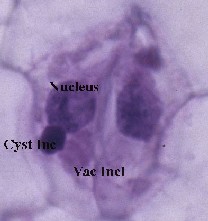Tobacco ringspot virus
Tobacco ringspot virus
Tobacco ringspot virus (TRSV) is a plant pathogenic virus that infects a wide range of plant species, particularly those in the family Solanaceae. It is known to cause significant damage to crops such as tobacco, tomato, and pepper.
Symptoms[edit | edit source]
Plants infected with Tobacco ringspot virus typically exhibit symptoms such as ring spots on leaves, yellowing of foliage, stunted growth, and reduced fruit production. These symptoms can vary depending on the host plant and environmental conditions.
Transmission[edit | edit source]
TRSV is primarily transmitted through mechanical means, such as contaminated tools or hands during cultivation. It can also be spread by insect vectors, including aphids and leafhoppers, which feed on infected plants and then transmit the virus to healthy plants.
Management[edit | edit source]
Preventative measures such as using disease-free planting material, practicing good sanitation, and controlling insect vectors can help reduce the spread of Tobacco ringspot virus. There are no known cures for viral infections in plants, so management strategies focus on prevention and control.
Impact[edit | edit source]
The presence of Tobacco ringspot virus can lead to significant economic losses for farmers due to reduced crop yields and quality. Infected plants may also serve as reservoirs for the virus, further contributing to its spread within agricultural settings.
Prevention[edit | edit source]
To prevent the spread of TRSV, it is important for growers to implement strict sanitation practices, monitor for symptoms of infection, and promptly remove and destroy infected plants. Additionally, using resistant plant varieties can help mitigate the impact of the virus on crops.
References[edit | edit source]
Search WikiMD
Ad.Tired of being Overweight? Try W8MD's physician weight loss program.
Semaglutide (Ozempic / Wegovy and Tirzepatide (Mounjaro / Zepbound) available.
Advertise on WikiMD
|
WikiMD's Wellness Encyclopedia |
| Let Food Be Thy Medicine Medicine Thy Food - Hippocrates |
Translate this page: - East Asian
中文,
日本,
한국어,
South Asian
हिन्दी,
தமிழ்,
తెలుగు,
Urdu,
ಕನ್ನಡ,
Southeast Asian
Indonesian,
Vietnamese,
Thai,
မြန်မာဘာသာ,
বাংলা
European
español,
Deutsch,
français,
Greek,
português do Brasil,
polski,
română,
русский,
Nederlands,
norsk,
svenska,
suomi,
Italian
Middle Eastern & African
عربى,
Turkish,
Persian,
Hebrew,
Afrikaans,
isiZulu,
Kiswahili,
Other
Bulgarian,
Hungarian,
Czech,
Swedish,
മലയാളം,
मराठी,
ਪੰਜਾਬੀ,
ગુજરાતી,
Portuguese,
Ukrainian
Medical Disclaimer: WikiMD is not a substitute for professional medical advice. The information on WikiMD is provided as an information resource only, may be incorrect, outdated or misleading, and is not to be used or relied on for any diagnostic or treatment purposes. Please consult your health care provider before making any healthcare decisions or for guidance about a specific medical condition. WikiMD expressly disclaims responsibility, and shall have no liability, for any damages, loss, injury, or liability whatsoever suffered as a result of your reliance on the information contained in this site. By visiting this site you agree to the foregoing terms and conditions, which may from time to time be changed or supplemented by WikiMD. If you do not agree to the foregoing terms and conditions, you should not enter or use this site. See full disclaimer.
Credits:Most images are courtesy of Wikimedia commons, and templates, categories Wikipedia, licensed under CC BY SA or similar.
Contributors: Prab R. Tumpati, MD

